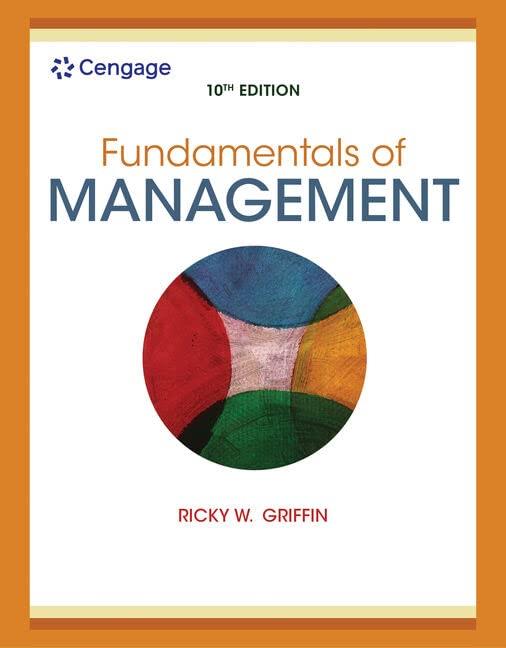Question
A Case of Union Discrimination? Work at the Toronto Transit Commission (TTC)is divided into three main groups or job families: transportation, maintenance and collectors. The
A Case of Union Discrimination?
Work at the Toronto Transit Commission (TTC)is divided into three main groups or job families: transportation, maintenance and collectors. The Amalgamated Transit Union (ATU) represents workers in each of these three distinct groups at the transit company. Under the collective agreement between the ATU and the TTC, seniority rights among the three groups see certain restrictions when transferring from one job family to another. For example, seniority gained in the transportation group cannot be transferred into the maintenance group. Similarly, seniority from maintenance cannot be transferred into transportation. However, seniority from either group can be transferred into the collectors' group.
Mr. Bubb-Clarke was a bus driver with the TTC and thus an ATU member for the past 10 years. He was recently diagnosed as having narcolepsy and was given medical advice that he could no longer drive a bus. The seniority he had gained as a driver (transportation group) could only be used in the transportation or collectors' groups, and not in maintenance. His medical condition also meant that the job of fare collector at various transit terminal stations in the city was unsuitable for him. A doctor's note did support Bubb-Clarke's ability to work in the maintenance group and he transferred to this area. However, as per the collective agreement rules, Bubb-Clark was prevented from transferring his ten years of seniority with this move.
The ATU executive committee, for compassionate reasons, subsequently voted to credit Bubb-Clarke with five years of seniority when he moved to the maintenance group, even though this was not provided for in the collective agreement. While he worked in the maintenance group, Bubb-Clarke was not able to use all of his transportation seniority to bid on other jobs. Even with the seniority granted by his union in this circumstance, Bubb-Clarke saw a significant gap in seniority within the maintenance unit and thus was frustrated at the lack of future job mobility.
Bubb-Clarke filed a complaint with the provincial human rights commission against his employer and union. During the hearing the TTC reached agreement with the human rights commission and did not oppose its suggested solution. The ATU, resisting any change to its position, claimed that the agreed-to collective agreement and the described seniority rules therein meant that they were powerless to take any further steps in the case. They did mention the voluntary action taken by the union to grant their member five years of seniority credits with the transfer.
Having heard all the evidence and in applying the three-step test for justification of a discriminatory rule fromMeiorin, the Board of Inquiry noted the "no transferability of seniority" rule failed steps 1 and 3 in reference to this legal precedent. The Board also stated there was no evidence as to why such a rule was implemented, and there was no evidence that there would be undue hardship to any other employee if Bubb-Clarke were permitted to transfer all of his transportation seniority into the maintenance group.
Having found that the terms of the collective agreement to be discriminatory, and that the union failed to justify the terms under the three-part test seen inMeiorin, the board of inquiry ordered the following:
- ATU to pay Bubb-Clarke general damages and damages for mental anguish at the rate of $4,000 per year, for a total of $22,000.
- Bubb-Clarke to be granted full seniority for all the time he has been employed by the TTC, transferable to his present position or any other position he may occupy as a result of his disability.
- TTC and ATU to grant to any employee who is disabled and who transfers to another position because of disability full seniority for all the time employed by the TTC.
- A declaration that a restriction on the transferability of seniority, where the transfer is because of disability, discriminates against the employee with a disability.
Questions
- What form of discrimination is seen in this case?
- What was the "protected ground" under the Code revealed in Mr. Bubb-Clarke's circumstances?
- Based on the case facts, what argument did the ATU advance for its inability to change what had already been done for Mr. Bubb-Clarke?
- As a labour relations manager for the TTC, after initially hearing of Bubb-Clarke's medical diagnosis and also understanding the collective agreement language related to seniority transfer, what steps would you have taken to avoid this situation? Explain why.
Step by Step Solution
There are 3 Steps involved in it
Step: 1

Get Instant Access with AI-Powered Solutions
See step-by-step solutions with expert insights and AI powered tools for academic success
Step: 2

Step: 3

Ace Your Homework with AI
Get the answers you need in no time with our AI-driven, step-by-step assistance
Get Started


